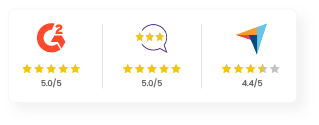Maximize Skill Growth with Social Learning in LMS

If you’ve spent time in corporate learning, you know that simply delivering content isn’t enough anymore. Employees aren’t just checking boxes. They want learning that sticks, that’s relevant, and that helps them actually do their jobs better.
That’s where social learning in Learning Management System (LMS) platforms comes in.
Across the world, companies are increasingly turning to LMS not just to host courses, but to create communities of learners. Yes, employees are consuming content. But it’s no more limited to that. They are also sharing insights, asking questions, collaborating on projects, and building skills together.
And here’s the exciting part: when done right, social learning improves engagement as well as drives real, measurable skill growth.
Let’s talk about how this works, why it matters, and how you can leverage it in your organization.
Also read: Leveraging Social Learning in LXPs for Collaborative Knowledge Sharing
Why Social Learning Matters
Think back to a time you learned something valuable, not from a slide deck, but from a colleague. Maybe it was a tip for closing a deal, a shortcut in a tool, or a creative way to handle a customer issue. That’s social learning: learning from others, in context, and at the moment it matters most.
Modern social learning LMS platforms bring that experience online. Discussion boards, chat groups, collaborative projects, and internal social feeds allow employees to share what they know and learn from what others know. The result is knowledge that spreads faster, skills that stick longer, and teams that perform far better.
Companies that have adopted LMS solutions for social learning are seeing this in action. What’s more, it’s not just about training internal employees anymore. It is about connecting with partners, vendors, and even customers to build a shared knowledge ecosystem. And yes, this approach shows a clear LMS ROI: learning that actually moves the needle for business outcomes.
Turning Collaboration into Skill Growth
Now, while collaboration sounds nice in theory, it becomes truly powerful only when you can measure it. That’s one of the things the right LMS can do for you: track interactions, group activity and peer contributions, which lets your organization see exactly how collaboration translates into skill improvement.
Some practical ways to drive this include:
Discussion Boards: Let your employees ask questions and get answers from peers. This isn’t just Q&A. It is a living library of knowledge.
Social Media Integration: Use platforms employees already know (Teams, Slack, WhatsApp) to make knowledge sharing seamless.
Group Projects: Real-world problem-solving builds teamwork and reinforces skills in context.
In my work with so many of Enthral’s global clients, I have seen that these tools aren’t just “nice-to-have.” They are creating tangible skill improvements. Teams are more aligned, knowledge flows across functions, and employees feel empowered to contribute their expertise. That’s the kind of skill growth you can actually see and measure.
The Benefits of Social Learning for Organizations
The numbers for sure tell a story, but so does human experience. Social learning impacts organizations in ways that go beyond just completion rates.
Here’s how:
Engagement That Lasts: Learners stay involved because they are part of a conversation, not just a course.
Continuous Development: Social learning supports professional growth in real-time. People aren’t waiting for the next training session. They are learning on the go.
Cross-Team Knowledge Sharing: Breaking silos isn’t just a goal. It becomes natural when collaboration is baked into learning.
Cost Efficiency: Peer-to-peer learning reduces the need for repetitive, instructor-led sessions while maintaining quality.
Better Retention: Skills stick because learning is reinforced through discussion and application.
In short, social learning LMS strategies are about making training more fun. But they are also about creating meaningful, sustainable learning impact.
How to Implement Social Learning Effectively
Here’s the reality: simply turning on discussion boards or chat features isn’t enough. Social learning thrives when you have the right tools and the right culture.
A few things I recommend:
1. Pick the LMS with the right features: Don’t overcomplicate. Choose an LMS that offers you discussion threads, peer reviews, group projects, and integrations that make collaboration natural.
2. Encourage a culture of sharing: Recognize contributions and create safe spaces for questions and discussions.
3. Blend learning modes: Combine instructor-led LMS and virtual instructor-led LMS sessions with social interactions. Live sessions help contextualize learning and foster engagement.
4. Gamify participation: Badges, leaderboards, and recognition can make collaboration more fun and motivating.
5. Add mentorship and peer coaching: Social learning works best when structured relationships guide informal learning.
When you implement social learning this way, the LMS stops being just a platform. It becomes a living, breathing learning community.
Using Analytics to Understand Impact
One of the things that excites me the most about social learning is that it’s measurable. Modern LMS platforms provide learning analytics that track not only course completion but also engagement, collaboration, and skill development.
You can answer questions like:
- Are employees actually applying what they learn?
- Which social interactions are driving the most skill growth?
- How does training translate into performance improvements?
By analyzing this data, you can refine learning paths, adjust content, and ensure training aligns with business goals. In my experience, this is where companies see real LMS ROI: learning that’s not just consumed but applied.
Making Social Learning Work for Your Business
At the end of the day, social learning in LMS is about more than technology. It’s about human behavior, culture and context. When done right, it transforms learning from a task to a shared journey.
For businesses, the benefits are clear: more engaged employees, faster skill acquisition, better knowledge sharing, and measurable business outcomes. The key is to combine the right LMS tools, a collaborative culture, and data-driven insights to continually evolve your programs.
If you are looking to make learning stick, focus on building connections, encouraging knowledge sharing, and leveraging analytics to see what works.
That’s exactly what Enthral’s social learning capabilities make possible. With features like Buddy, Mentor, and Coach interactions, employees learn together while transferring skills on the job. Dedicated discussion boards, real-time chat, and topic-focused polls create a collaborative environment where insights flow freely between peers and instructors. Content sharing and mobile access ensure learning doesn’t stop at the desk, while Agentic AI quietly guides learners with timely prompts to reinforce knowledge and encourage meaningful interactions.
With Enthral, skill growth happens in context, in real time, and with measurable impact. Remember, social learning isn’t just a trend. It’s the future of how organizations develop talent, boost performance, and stay competitive. And in my experience, when you get it right, the results are visible not just in dashboards, but in the day-to-day confidence, capability, and collaboration of your teams.
FAQs
1. What is social learning in an LMS, and why is it important?
Social learning in an LMS is about enabling employees to learn from each other through collaboration, discussions, mentoring, and peer-to-peer interactions. For businesses, it’s crucial because it turns training into an engaging, real-world experience where skills are reinforced through shared knowledge, improving retention, team performance, and measurable skill growth.
2. How can collaboration within an LMS drive measurable skill growth?
Collaboration features like discussion boards, group projects, social feeds, and integrated chat allow employees to exchange knowledge and apply learning in context. By tracking these interactions, organizations can see which activities are driving skill development and engagement, turning collaborative learning into a measurable business outcome.
3. What strategies make social learning effective in an LMS?
To make social learning work, companies should:
Choose LMS platforms with discussion threads, peer reviews, and group project capabilities
- Promote a culture of sharing and recognize contributions
- Blend instructor-led and virtual instructor-led sessions with social features
- Use gamification, mentorship, and peer coaching to motivate participation
- This combination ensures that social learning is structured, engaging, and impactful.
4. How does Enthral support social learning and skill growth?
Enthral’s LMS enables social learning through Buddy, Mentor, and Coach interactions, discussion boards, real-time chat, and topic-focused polls. Employees can share insights, ask questions, and collaborate seamlessly—on desktop or mobile. With Agentic AI, learners also receive timely, context-aware prompts to reinforce skills. The result is measurable skill growth, better engagement, and a collaborative learning culture that drives business outcomes.












